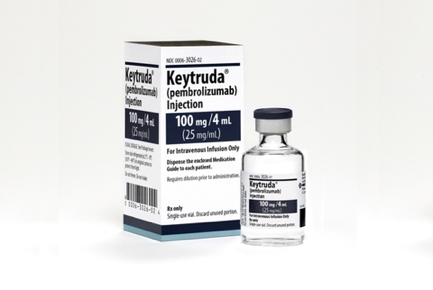Staff Writer, TMN Jul 04, 2018 6 years, 9 months, 2 weeks, 4 days, 4 hours, 2 minutes ago
The US Food and Drug Administration (FDA) has approved updated labeling for
Keytruda (pembrolizumab;
Merck) and
Tecentriq (atezolizumab;
Genentech) for patients with locally advanced or metastatic urothelial cancer who are not eligible for cisplatin-containing chemotherapy.
The USFDA is continuing to review Merck's Keytruda and Roche's Tecentriq in previously untreated bladder
cancer patients. (Merck)
The updates come after the Agency made the decision to limit the use of these agents as monotherapy in patients with metastatic urothelial cancer who have not received prior therapy and who have low expression of the protein programmed death ligand 1 (PD-L1). Specifically, a review of early data in the ongoing KEYNOTE-361 study showed that patients with low PD-L1 expression who received Keytruda monotherapy had decreased survival vs patients who received platinum-based chemotherapy.
Similarly, a review of early data from the ongoing IMvigor130 study showed that patients with low PD-L1 expression (<5%) who received Tecentriq monotherapy had reduced survival vs patients who received platinum-based chemotherapy.
The independent Data Monitoring Committee for both trials recommended that no more patients with low PD-L1 expression be recruited for the monotherapy treatment arm.
As a result, the labeling for both products has been revised to reflect the new limitation:
Keytruda is indicated for the treatment of patients with locally advanced or metastatic urothelial carcinoma who are not eligible for cisplatin-containing therapy and whose tumors express PD-L1 (Combined Positive Score ≥ 10), or in patients who are not eligible for any platinum-containing chemotherapy regardless of PD-L1 status.
Tecentriq is indicated for the treatment of patients with locally advanced or metastatic urothelial carcinoma who:
- Are not eligible for cisplatin-containing therapy, and whose tumors express PD-L1 (PD-L1 stained tumor-infiltrating immune cells [IC] covering ≥5% of the tumor area), as determined by an FDA-approved test, or
- Are not eligible for any platinum-containing therapy regardless of PD-L1 status.
The Ventana PD-L1 (SP142) Assay, which was recently approved by the FDA, should be used to select patients with locally advanced or metastatic urothelial carcinoma for treatment with Tecentriq.
The US FDA is continuing to review data from analyses and will announce new information on PD-L1 assays and indications as it becomes available.
